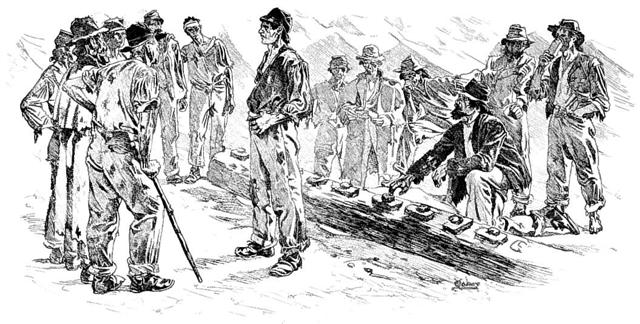
The sun was giving us the benefit of its direct rays, which soon roused us, in a degree, from the stupor into which we had subsided as a partial realization of the situation crept upon our senses; and we began to make a move towards forming some kind of shelter to protect us from the scorching heat. My stock consisted of an overcoat—nothing more.
Richard Lovell, Richard Williams, and Charles Wilmarth, who had associated with me thus far, now proposed that we unite our stock, and thus build a common shelter. Our combined effects consisted of two woolen blankets, two overcoats, two case-knives, an apology for a pocket-knife, two tin cups, one tin plate, and three canteens; nothing superfluous, as can be readily seen, in necessary material for four men to build a house and begin keeping it with. We selected the best unoccupied spot for a location; with our case-knives and hands we scooped a level place upon the hillside barely large enough for our number to lie upon. It was necessary that we should have two upright poles and a cross pole, or ridge pole, in order to stretch our blankets in the form of a roof over our heads. We thoroughly searched the whole interior of the stockade for material enough for the purpose, but could obtain none without purchasing; and we finally bargained for three poles, each of them smaller than common bean-poles, by paying a dollar and fifty cents in greenbacks. Towards night we had finished our shelter, so far as lay in our power, but were obliged to leave both gable ends open, using our coats for protection between our persons and the ground.
We were very hungry, having had nothing to eat all day, but about the middle of the afternoon rations began to come in. They were loaded upon wagons, each wagon drawn by two mules, and consisted of coarse corn-bread and old bacon. Each wagon was accompanied by a guard while being driven within the stockade and distributing its load at the headquarters of each detachment. The detachment sergeants issued it in equal lots to the three squad sergeants, and they again, dividing it as equally as possible, gave to the ninety individual men.
I was somewhat curious to see the operation of issuing the rations to so many men; how it might be done fairly, so that each would be satisfied. The sergeant in charge, seeing me looking on with so much interest, called upon me to assist. After the bread and meat had been divided into the requisite number of pieces they were placed upon a log, which I was informed was the property of the squad. One piece of bread, about half the size of a brick, and a piece of meat, as large as two of my fingers, was the ration for each man for a whole day.
It would be impossible for any man, however nice his judgment, to divide the bread and meat into exactly even pieces; some would have a mouthful or a mouthful and a half more than others, and some pieces would be better in quality than others: in either case an item not to be overlooked by starving men.

We were all numbered, and so soon as the rations were ready for delivery I was asked to turn my back to them; then the sergeant would place his hand upon one of the rations, at the same moment asking me what number should have it. I called out what number I pleased; and, not being able to see what particular ration the sergeant had his hand upon, no one could complain that any favoritism was shown. This was, in substance, the manner in which our rations were dealt out from day to day throughout the whole stockade.
As night came on I repaired to the shelter we had improvised, but not to talk with my comrades; neither did they show any disposition to converse during this first evening and night spent in Andersonville: our individual thoughts were too busy with themselves. I was trying to comprehend the situation, to weigh the probabilities of life or death.
visits since 02/20/2004.
Page updated
05/25/2006